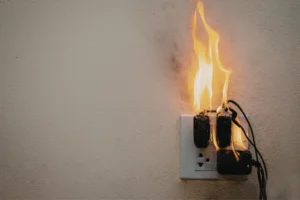What Are Insurance-Preferred Contractors?
The Pros of Insurance-Preferred Contractors
Streamlined Claims Process
Preferred contractors are familiar with the claims processes of insurance companies, which can result in quicker approvals and smoother paperwork. For homeowners navigating the stress of property damage, this can feel like a significant relief.
Immediate Availability
Large companies like SERVPRO or Belfor have nationwide networks and extensive resources, allowing them to deploy crews quickly, especially during widespread disasters.
The Cons of Insurance-Preferred Contractors
Conflict of Interest
Insurance companies aim to minimize their costs, and their preferred vendors often operate under the same mandate. This can lead to shortcuts or incomplete work that prioritizes savings over proper restoration.
Real-Life Scenario
Imagine you have extensive water damage affecting your drywall and insulation. A preferred vendor might opt to “dry in place” rather than remove and replace these materials. While this saves the insurance company money in the short term, it leaves your home vulnerable to mold growth and structural issues later. Independent contractors, on the other hand, are more likely to follow IICRC (Institute of Inspection Cleaning and Restoration Certification) standards, ensuring thorough remediation.
Limited Quality Control
Nationwide brands often subcontract the repair phase of a restoration project to local teams. This means you could end up working with multiple contractors who might not communicate effectively. Worse yet, some insurance-preferred contractors might leave repairs incomplete, requiring you to hire another contractor to finish the job.
Standardized, One-Size-Fits-All Approach
Large-scale franchises use standardized methods and materials to serve a high volume of customers quickly. This approach can overlook your home’s unique needs, leading to improper restoration. Independent contractors, by contrast, provide customized solutions tailored to your property.
The Pros of Independent Restoration Companies
Homeowner Advocacy
Independent restoration companies work for you—not your insurance company. Their primary focus is ensuring your home is restored to pre-loss condition, not cutting costs for the insurer. This homeowner-first approach often results in higher-quality work.
Personalized Service
Local, independent contractors understand your specific needs, whether it’s addressing humidity-related mold risks or managing sewage cleanup with older infrastructure in mind. They assess each situation individually and tailor their methods accordingly.
Transparent Communication
You’ll work directly with the restoration team, ensuring clear and honest updates throughout the process. This level of transparency helps build trust and reduces stress during a challenging time.
The Cons of Independent Restoration Companies
Navigating Insurance
Independent contractors may not have pre-established relationships with insurers, meaning you’ll need to play a more active role in managing your claim. However, reputable independent companies often assist with documentation to ensure claims are approved.
Limited Scalability
Independent companies may not have the same resources as nationwide franchises during widespread disasters. However, they typically excel in localized service areas, offering quicker response times and higher quality for individual homeowners.
Comparing Nationwide Brands
Nationwide restoration brands, often referred to as “big-name contractors,” are known for their large-scale operations and extensive reach. These companies—like SERVPRO, ServiceMaster, Belfor, ATI, and Restoration 1—frequently serve as insurance-preferred contractors due to their ability to manage high volumes of claims across the country. However, their performance and approach can vary widely.
Pros of Nationwide Brands
Extensive Resources
These companies have the manpower and equipment to respond quickly, particularly during widespread disasters like floods or hurricanes.
Streamlined Processes
Their established relationships with insurance companies can make the claims process more straightforward for homeowners.
Cons of Nationwide Brands
Inconsistent Service Quality
Standardized Approach
Fragmented Repairs
Why Independent Restoration Companies Are Often Better
Adherence to IICRC Standards
Independent companies prioritize industry best practices, such as IICRC standards, ensuring the highest level of restoration. This includes proper drying techniques, thorough mold remediation, and complete sewage cleanup to restore your home safely and effectively.
Continuity of Care
With independent companies, the same team manages your project from start to finish. This continuity eliminates miscommunication and ensures the job is done right the first time.
Advocacy and Accountability
Independent contractors advocate for you during insurance negotiations, ensuring all necessary repairs are covered. They also stand behind their work with warranties and clear guarantees.
Key Considerations for Homeowners
When deciding between an insurance-preferred contractor and an independent restoration company, ask yourself:
1. Who is truly looking out for my best interests
2. Will the work meet industry standards to prevent future problems
3. Am I comfortable looking for a repairman if they preferred vendor only does mitigation?
Conclusion: Make the Best Choice for Your Home
Choosing the right restoration company is essential to protecting your home and investment. While insurance-preferred contractors may offer convenience, they often prioritize the insurance company’s interests over yours. Independent restoration companies, by contrast, focus on quality work, transparency, and homeowner advocacy.
When disaster strikes, choose a team that’s truly on your side. Independent restoration companies are equipped to handle everything from water damage to mold remediation and sewage cleanup, ensuring your home is restored safely and thoroughly.
For expert restoration services, contact your local independent contractor today. Let us help you rebuild better.





